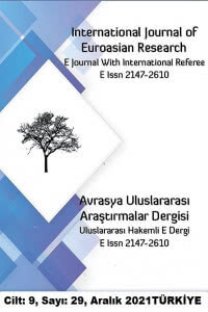SCIENCE FICTION IN RUSSIAN LITERATURE AND CINEMA
Öz In the 20th century, science and technology, which penetrated into every individual’s life after the Enlightenment and Industrial Revolution, gained a complete dominance over foremostly daily life of the humankind and all other fields by demonstrating a progress further than the ground covered throughout the human history. This process at the same time has caused various kinds of appearances within the world of thought of the humanity. By considering the positive and negative effects of science and technology on the human life, utopic and dystopic narratives were produced. The last 200-250 years of the human history have gone by witnessing that these ideas created debates, concepts, theories, facts, and practices not only within the fields of art but also in the social and political arenas. Particularly, it is an undeniable truth regarding the social and political influences of the literary and visual instances of science fiction, which is one of these concepts. In general, an investigation concerning the 20th century adventure of science fiction at the same time offers an opportunity for a depth discussion in regards to the social and political atmosphere of the 20th century as well. For this reason, by this article, while the science fiction works in Russian literature and cinema and the conditions cause to exhibit them will be handled, on the other hand, it will be tried to disclose the hints of the social and political circumstances of the era.
Anahtar Kelimeler:
Russian literature, , Russian Cinema, , science fiction,
___
- BANERJEE, A. (2012). We Modern People: Science Fiction and the Making of Russian Modernity. Middletown CT: Wesleyan University Press.
- BUCK-Morss, S. (2000). Dreamworld and Catastrophe: The Passing of Mass Utopia in East and West. Cambridge and London: MIT Press.
- CHRISTENSEN, P. G. (2000). Women as Princesses or Comrades: Ambivalence in Yakov PROTAZANOV'S “Aelita” (1924). New Zealand Slavonic Journal, 107-122.
- ISSN: 2147-2610
- Yayın Aralığı: Yılda 4 Sayı
- Başlangıç: 2012
- Yayıncı: Kürşat Öncül
Sayıdaki Diğer Makaleler
SOSYAL MEDYADA TÜRK ATASÖZLERİNİN DURUMU ÜZERİNE BAZI TESPİTLER
SCIENCE FICTION IN RUSSIAN LITERATURE AND CINEMA
MOLLA NASREDDİN DERGİSİNİN İKİ ÖNEMLİ YAZARI: MİRZA CELİL VE SABİR
KÜLTÜREL DİPLOMASİDE CİNSİYET, TÜRK KADIN DİPLOMATLARIN İŞLEVLERİ
MUHAFAZAKÂR VE SEKÜLER GENÇLERİN FARKLI KÜLTÜRLERLE BİR ARADA YAŞAMAYA YÖNELİK BAKIŞ AÇILARI
TÜRKİYE’DE ALEVİLİK- BEKTAŞİLİKLE İLGİLİ HAZIRLANAN SÖZLÜKLERİ ELEŞTİREL OKUMA DENEMESİ
